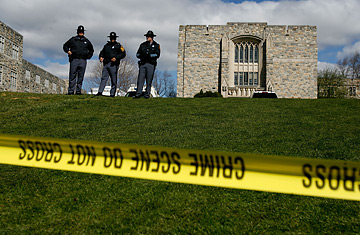
Virginia State Police stand guard outside Norris Hall, at Virginia Polytechnic Institute and State University, where at least 33 people died in two shootings on campus in Blacksburg, Virginia, on April 16, 2007.
Unlike most elementary and high schools, college campuses are almost by design too sprawling to cordon off. Their layouts have long been intended to reflect higher education's free flow of ideas, and such philosophical openness makes adding metal detectors not only undesirable but also logistically impossible. "Unless," says Mark Meyer, director of sales at metal-detector firm CEIA, "you want to make a campus into a fortress."
And no one — not even campus safety directors — is likely to push for such an outcome. Still, some select parts of campuses have been successfully secured in recent years. Sexual assault and other incidents in college dorms have led many schools to control access to these buildings by giving residents a kind of electronic key, often called a prox card, that can also be used to track the comings and goings of individual students. This technology is starting to spread to academic buildings, but daytime access to classrooms is still largely unrestricted.
|
Related Articles When a School Learns to Mourn The Gun Lobby's Counterattack Where Cho Bought His Deadly Weapon Behind the Killings, a Troubled Mind South Korea's Collective Guilt Inside Cho Seung Hui's Dorm How to Make Campuses Safer The Virginia Tech Victims A Partial Biographical List of The Dead Fatal Shootings at Colleges and Schools Photo Essay Night Falls on Virginia Tech Scenes From the Shooting From CNN.com Killings at Va. Tech Local Coverage Virginia Tech's Website The latest information from the campus Roanoke.com/The Roanoke Times Regional News A List of Confirmed Dead (CollegiateTimes.com) From the TIME Archive Gunman Kills Three at Virgina School After the School Shootings Police Seeking Motive In Montreal College Shooting Bush Takes On School Shootings The Columbine Tapes The Columbine Papers: What Their Parents Knew Columbine Report: More Details Than Answers |
In the Virginia Tech massacre, parents and students were outraged that the school took so long to notify people that a gunman was on the loose, and when the announcement was finally made — some two hours after the first reports of gun shots on campus — the warning was delivered silently over email. But technology exists that could have sent more students inside, behind locked doors, much sooner. The University of North Carolina at Charlotte is one of 10 schools that is using Digital Acoustics' high-tech intercom system, which can immediately broadcast a message to a single classroom or to the entire campus or to any combination in between.
Johns Hopkins University is using cutting-edge technology — every few weeks, campus safety officers from yet another school come by to check out the new system — which places "smart" video cameras around campus that rely on computer algorithms to detect suspicious activity. The university is about to install another camera, bringing the total to 102 on its main Homewood campus, that will alert a security officer if it films someone climbing up a fence, walking down an alley late at night or lingering by a windowsill. But, says a Johns Hopkins spokesman, the software is not yet able to pick out whether a person is carrying a gun.
Sophisticated technology doesn't come cheap, and neither do highly trained campus security officers. In the past, says Steven Healy, public safety director at Princeton University, campus security officers have had to fight for limited resources at many schools by "asking people to imagine the unimaginable."
But even if Monday's events help loosen purse strings, security systems are improving at such a rapid pace that schools aren't sure how much to buy. "When do you say stop?," asks Healy, who is also president of the International Association of Campus Law Enforcement Administrators. "We don't want to create fortresses."
He and others stress the need for more highly trained officers. "But how many boots do you put on the ground?" Healy asks. "You can't assign an officer to every student."
Some schools like Princeton train professors how to spot signs of depression, and access to mental-health services is a big part of preventive efforts on many campuses. Students, faculty and staff are encouraged to tell someone if they see suspicious or troubling activity. Says Gene Burton, public safety director at Ball State University: "You need to get everyone on board." But as colleges and universities learned on Monday, it often takes a tragedy to expose just how many weaknesses there are in the system.
